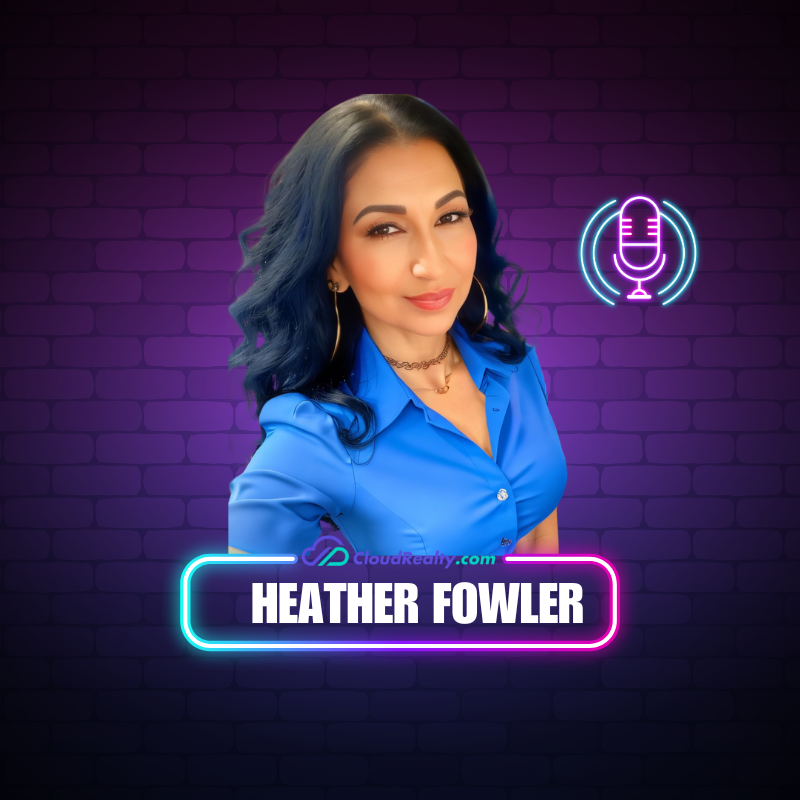Episode Transcript
[00:00:01] Speaker A: Hey, guys. Welcome back to Head in the Clouds, the place where real estate professionals can get real advice minus the fluff. Today is definitely a special one. Today we're talking about something every agent thinks about after the offer is accepted, but should really be thinking about way earlier in the transaction, and that is insurance. So we're not just talking like policy paperwork, but protection, peace of mind, and a powerful partnership for you and for your clients. Joining me today is Malachi Loyal. He is an insurance advisor with comparison insurance agency.
Hey, Malak. Hi. Thanks for being here.
[00:00:34] Speaker B: Hey, Heather, thanks for inviting me along. I'm actually really excited to do this podcast with you. Definitely talk about some insurance. It's something very important to everybody, especially for you. A major investment of the house.
[00:00:47] Speaker A: Definitely. And we talking about relationships, which is basically the theme of my entire podcast. We actually have a great relationship. You, me, Tony, and you are our insurance advisor as well. And we just added two kids and we're about to add another kid to her car insurance.
[00:01:04] Speaker B: Exactly.
[00:01:05] Speaker A: But let's talk about that. For agents listening, home buyers listening that don't really understand what the insurance policy is as far as like homeownership and having insurance, what is that and what does that look like?
[00:01:17] Speaker B: Having insurance is super important.
Homeownership is very important. But having insurance on your major life investment is something that you definitely want to have no matter what. If you have a mortgage, it's mandatory that you have insurance. If your home is paid off, you're allowed not to have insurance. If something happens, like a catastrophe happens, what's going to happen to your home? So your huge investment is gone because you just don't have insurance. And definitely having the right coverages is very important as well. Just understanding your deductibles, your dwelling coverage, that's actually a rebuild coverage is definitely what you need to be looking for.
[00:02:00] Speaker A: I know. I hear the phrase transfer of risk sometimes used when it comes with insurance. Can you break that down for us and explain to us what that means?
[00:02:09] Speaker B: Risk is your property and it's an event of actually something that happens like fire or wind or hail damage, depending if you are actually in a flood zone, like flooding.
So it's the transfer of risk. So that's the insurance take on your property, which is the risk of something actually happen because it's not predictable. And that's what the transfer risk is.
[00:02:36] Speaker A: And who needs home insurance? You said if you have a mortgage you need. But who would be the people who would think they wouldn't, but definitely would, other than people who have their house paid off.
[00:02:47] Speaker B: Everybody needs home insurance. You got to protect your biggest investment to look at how much a home costs versus a car and how much a dollar amount that you're actually investing in repairing or fixing or investing your home. You want to make sure protect your investment.
That's the reason why you have to have home.
[00:03:08] Speaker A: Do renters need insurance?
[00:03:11] Speaker B: Renters need insurance. Renters insurance protects you for just in case you have fire or theft or possibly water damage on your personal belongings and then also liability as well if something happens on your property.
So you definitely want to have renters insurance no matter what. Even renters policies are very small amount of money. If you live in a complex that does not necessarily require it, I would definitely suggest you actually get it.
[00:03:44] Speaker A: What about, let's say for instance, you're renting a private home and you know that the homeowner has insurance on the home. Should you still get renters insurance on that?
[00:03:53] Speaker B: Absolutely. Your valuables, like your jewelry, your dining room table, your couches, your TVs, your antique valuable artwork, all that's actually included. Those are things that you actually have to think about like hey, what happened? If I don't have that, I have to restart.
And that could be costly.
[00:04:17] Speaker A: So definitely, even if you're renting and they have insurance, make sure you're covered. Because the homeowner's insurance would cover the housing damage, but like you're saying it wouldn't cover their personal belongings inside the home most of the time.
[00:04:30] Speaker B: That's right, they just covered the home. The renters insurance cover your personal property and you definitely want to cover your personal property because anything happens you have to start all over again. And buying furniture these days and buying TV or just your own valuables, that sentimental values is just there's a lot protected now.
[00:04:52] Speaker A: Let's say there's a fire and your home is destroyed and let's kind of get back to the home buyers now and God forbid you lose everything. Some things aren't replaceable, obviously, like photos of older generations, letters, pictures, things like that. But how do you as a person prove that you had belongings in your house that you want covered?
[00:05:12] Speaker B: Okay, so when things actually happen, they'll do like itemized list.
Depending on the carriers it is, it'd be like itemized list. And you just actually explain, say hey, this is what I have, this what I have, this what I have. And they're going to ask those questions during the process when actually event of actually apparel actually happened.
[00:05:35] Speaker A: If you have and I don't know Maybe this is a dumb question, but I just got to thinking about this. Let's say you have some crazy expensive painting that you got passed down from generation. It's like this million dollar painting. Should that be insured separately on a separate.
Like you.
[00:05:52] Speaker B: You can. There's some actually carriers that you can do like artwork. You can actually do carriers for artwork for your home. But you just need get an appraisal.
Once you get the appraisal, you actually send it to the home insurance carrier and then you're going to be able to have that on your list where you can claim on your home insurance. That's very good question.
[00:06:16] Speaker A: No, that's good to know. When buyers are in this process of getting under contract looking at houses, when should they start thinking about insurance in the whole buyer journey?
[00:06:30] Speaker B: Soon as you get under contract, they need to be thinking about insurance immediately.
They need to be thinking about where their investment, what their protection is, what it looks like.
Day 1.
[00:06:42] Speaker A: Do different areas and locations affect the price of insurance?
[00:06:46] Speaker B: Different zip codes do make a difference due to actually events of apparels.
So certain areas have events of apparels that actually happens. And then it could be a situation, it could be a lower risk, it could be a higher risk.
So that actually makes a difference of your price point as well.
[00:07:08] Speaker A: Is there any locations where it's like a flood zone or a hazard or stuff built there is just going to be more at risk.
And is that something agents should be mindful of when they're showing their buyers?
[00:07:22] Speaker B: If you are actually in a coastal area, that's when you have to think about the flood insurance. Coastal areas going to be a little more higher risk because of actually a chance of a flood or water damage to property. And that's when you go have two sets of insurance. You have a regular home insurance policy and then you have a flood insurance policy.
[00:07:43] Speaker A: Can you break down the different coverage I have like coverage A to F. Can you break that down for us?
[00:07:49] Speaker B: Yeah. So we're talking about COVID insurance questions like basically on a declaration page, we're going to talk about coverage A. Coverage A is a dwelling cost. That's actually the rebuild cost of a home. So if your home is value of $450,000, we should have your dwelling to match $450,000. That's going to be A Coverage A.
Coverage B.
Other structures is like your sheds, some of the other garages, maybe a gazebo, fences.
That's going to be cover your other structures. C. Personal property. Personal property is your personal property. Dining room, chairs, tables Artwork, paintings, electronics, jewelry, silverware, fur, fire alarms.
That's covered under personal property D is loss of use.
That's in case of. And your house is not livable. The insurance company is going to give you a certain amount of money to either rent a hotel, live an apartment until your home is actually rebuilt.
Coverage E is liability.
Something happens, somebody's on your property and something happened to them, the injury could be significant. That personal liability is used from the insurance company to help compensate the person that got injured, as well as coverage F, which is medical payments to others. Like medical payments, doctor's visits, hospital visits, et cetera. That's what it covers.
[00:09:30] Speaker A: Folks out of the coverages, is there one that tends to get overlooked?
[00:09:37] Speaker B: They're all. I'll be honest with you there. The biggest thing that you definitely want to look at on a yearly basis, you're going to get like a tax bill and they're going to tell you like a valuation of how much your house actually cost.
[00:09:52] Speaker C: Okay.
[00:09:53] Speaker B: And there's some other tools that you could use. And you take a look and see, okay, this tax bill shows this right here, this method shows me another price. And then maybe talk to your local agent and kind of say, hey, maybe you're underinsured. Being overinsured is not a big deal, but being underinsured could be actually not a good thing.
[00:10:15] Speaker C: Okay.
[00:10:16] Speaker B: Especially actually how home prices actually increases over the years.
But I highly recommend that you take a look at your tax bill, ask some questions in your county about your property, exactly how much it costs. I think that would be something we definitely want to look at. And consult your mortgage company as well, just to see, say, hey, this is my value here, just to have all.
[00:10:38] Speaker A: The information you need with the different types of insurances. You have car insurance, you have home insurance. Do you have to have those with the same company? Is there a benefit to having them with the same company?
[00:10:50] Speaker B: Ah, good question. So majority of the home carriers and auto carriers, if you do a bundle, you get actually a better rate at times. Sometimes it doesn't work out that way. You might have two different companies. I'm just being honest. That does actually happen. So just depending on everybody's circumstances is different, Everybody's scoring is a little bit different. So it just depends on what exactly you're at, where your home is at, where your cars are at. It just depends. You might have different ages of drivers, so different drivers might be better. This one carrier versus actually another one.
[00:11:29] Speaker A: Let's focus on you and talk about you for a little bit. And Remind me, how long have you been in the industry and what brought you to insurance?
[00:11:37] Speaker B: Five years. I've been insured for five years, Remy. Insurance is.
I wanted to help people and their goals of understanding the insurance that they're purchasing. I felt that insurance was a great opportunity to help people in protecting their investments and it looked like a great opportunity for me and I actually really enjoy it. Every day I get to different people and get to interact and help understand their situation and try to navigate the insurance to help them.
[00:12:17] Speaker A: Now can. Are you covered for all of Georgia?
[00:12:19] Speaker B: Yes, I am.
[00:12:20] Speaker A: You can help somebody whether they're like way up north or way south Georgia, it doesn't matter.
Perfect. In your day to day life as an insurance advisor, what does that relationship look like with real estate agents and where do you find yourself getting your most referral type business? Is that from agents or is it just from independent buyers?
[00:12:42] Speaker B: It's a mixture of both. Referrals go a long way. I do get phone calls from referrals from agents that have a new home buyer or I might have customer that's say, hey, my relative or my friend about to buy a home or need home insurance.
And I just do everything I can to provide good customer service.
[00:13:02] Speaker A: Well, I know from experience you definitely do provide good customer service because I was actually just thinking about when Tony called you and was telling you about the car that he wanted to insure for his son and you were like, nope.
[00:13:16] Speaker B: Yeah, just think about it.
And just because you know it, depending on the age and the type of vehicle, it makes a big difference on the price points. Some cars actually give better ratings on insurance. So at all times I just think it's like, okay, you sure you want to do it? Okay, you sure you want to try this one right here? I know it might not be the most sexiest car.
[00:13:44] Speaker A: Hey buddy, think about that car for a second with a 16 year old boy.
[00:13:49] Speaker B: Yeah, correct.
[00:13:51] Speaker A: I like the fact that the people that we work with and we send our clients to, they are there looking out for the best interest of the customer. They're not out to say, hey, I can make a buck off of this person or I can make a buck off of that person. It's about actually helping people, actually caring about people and making sure that you're setting somebody up for success and not just lining your pockets along the way.
[00:14:14] Speaker B: That's right. You want to make sure you take care of everybody. You just being transparent and just giving the options. It's always the best.
[00:14:23] Speaker A: It really is. That's what Makes lasting relationships and referrals and repeat customers. If you're doing the right thing, you don't have to beg for referrals. They'll just come.
[00:14:34] Speaker B: That's right.
That's absolutely correct.
[00:14:37] Speaker A: So speaking of real estate agents working with agents, what is something that you wish agents knew or frustrates you about agents?
[00:14:48] Speaker B: All right, here's the suggestion. For like new home buyers or for agents with like new home buyers.
Find out the age of the roof.
[00:14:57] Speaker C: Okay.
[00:14:58] Speaker B: Age of the roof, a lot of times will play the part of actually the price of your insurance.
[00:15:06] Speaker C: Okay.
[00:15:07] Speaker B: If you have something older than 15 years, the price point might be a little bit higher than actually a newer roof, depending on age of the home. A lot of times when you buy like an older home, find out the age of the plumbing, Asia electrical system, heating and air conditioning, a big one. That's really important. A lot of people don't see it is trees and bushes touching the side of the homes or the roof.
A lot of home carriers will see that as a risk during a due diligence time. Maybe talk to the listing agent and talk to actually homeowners, say, hey, we're going to have issues with the home insurance because trees, limbs, or bushes touching the side of the roof or touching the home, that can cause damage in the future.
[00:16:08] Speaker A: So many houses have that. Especially here in Georgia. There's trees everywhere. There's a lot of that. When I had the first home that I owned, we had a lot of trees that they weren't touching the house, but they were over the house, if that makes sense. And we had a horrible scorpion problem. Like I'm talking three to five a day that we would find around the house. Once we thinned out those trees and got them all off of the house, the scorpions almost went away because they were actually falling off the trees, landing on the roof and coming into the house.
[00:16:40] Speaker B: Yeah, that is key. So a lot of home carriers, they'll have like aerial imaging automatically and they can tell and see if there's trees touching the home.
And at times you might have to actually send in pictures and proof that these trees are not touching the roof or not even there anymore.
So that's huge.
[00:17:09] Speaker A: That's a good takeaway for our.
[00:17:11] Speaker B: Yeah, absolutely.
[00:17:13] Speaker A: Don't have any trees or bushes touching the house.
[00:17:17] Speaker B: Right? Yeah, bushes could cause damage. It can deteriorate your bricks, your wood. It can actually turn it green, cause mold, all different things. So you just want to take care of that. Definitely in the due diligent part where you can talk to the listing agent to speak with the seller and say, hey, we got some things going on and we need it so they could get insurance. So it's really important because anything insurance company can say, hey, I'm not going to take your insurance.
Or I could take the insurance, but you got to do these items here. So it's always good to do preventatively versus after the fact.
Because a lot of times a homeowner don't know anything about that. They just buying a home, they're just excited just to be inside the home.
[00:18:00] Speaker A: So walk us through that. Let's focus on that. Let's say, because we've done this many times, Tony and I with you, but let's say that we have a buyer, we show them a house, they like it, they want to go under contract. Obviously, our next step is to call you and say, hey, this is the address of the house. Can you give us a quote? What happens then on your end to from like the phone rings, that's me or Tony. And we say, hey, this is the buyer, this is the house. 1, 2, 3 Main Street. How does the rest of your day look?
[00:18:28] Speaker B: Okay, so I first and foremost, I talked with the customer and I talked to them about their home, what they know about the home, just details how they feel about it. And then take a look at the listing and just go over some things and ask some questions about the roof, the heating, air conditioning. I talked about electrical and heating air conditioner. And I explained through them all the whole, everything that we just actually went over with. So they can actually have a, like a clear understanding on what exactly that they need to be looking for. And then I go over the coverages as well. Once we get to the part after I gather all the information, I talk about the coverages, I talk to them about the dwelling, their personal property liability, just so they have what's going on. Because a lot of times they say, well, I got insurance, but they don't know exactly what's covered and what exactly is actually really needed.
[00:19:27] Speaker C: Okay.
[00:19:28] Speaker B: It's like there's two different homes. We have a single family home and then you have a condo.
Single family home covers inside the home and exterior. The condo actually does cover insurance. Actually cover inside the home, like a drywall and the flooring, everything.
So a lot of times they just like, oh, I didn't realize that you don't cover exterior. Said, nope. Your master policy covers the exterior, which are actually hoa. They actually covers that. And a lot of times a lot of people don't know exactly what's happening. They're just excited to purchase.
So just to give them idea and go over the coverages and just to go over some of the price points, they feel at ease and great things actually happens. I just work very hard. Sometimes I provide that customer service and if they don't become part of my team or get a policy with me, I actually follow up with them and to see how their journey's coming along and maybe win their business as well.
That's what I do.
[00:20:40] Speaker A: That's awesome. Do you have any funny, crazy or scary stories for us about insurance?
[00:20:50] Speaker B: Scary stories?
No.
I pretty much tell everybody their coverages and they know what they're getting. And I actually, I looked at her properties and kind of. I talked to them about what's going on beforehand.
Interesting story.
[00:21:08] Speaker A: The weirdest claim that you've ever had.
[00:21:12] Speaker B: They're all just. There's nothing weird.
It's all just relative.
Somebody might file an auto claim.
And as long as I provide them the service, everything, the insurance company actually take care of it because I display them, I just make sure they get to the number to the claims and I actually follow up with the customer. Everything just seemed like it really works out. As long as they actually understand the coverages, they understand what they need. The biggest thing is a lot of times the customer needs to know what they have covered and they need to know their agent can actually provide them this service and to make sure to get to the claims department and they understand what exactly it's going to take or what they're going to need.
So I'm actually kind of thorough in that situation. So nothing's really like I. There's. Everything's generic. The biggest thing is when a claim actually happens, majority of the customers, they are.
They get rattled.
[00:22:20] Speaker C: Okay?
[00:22:21] Speaker B: They get rattled. And it's very important that you stay calm and you just be actually a voice for them. And you want to just make sure you guide them to where they need to be at. Because majority of time everybody's going to be rattled because something's happened. It's like, hey, oh, what is going to happen next?
You take your time, be thorough.
They got the coverages and you just make them feel at ease about actually what's about to actually happen. That's the biggest thing right there. The biggest thing is for agent is to be calm and to give reason, the voice of reason with the customer and just guide them to what exactly they need to do and just give to the claims and to make sure. Because a lot of times. They are frantic at times. But as long as you just provide the service and give them the understanding what they got to do next, that's when everything is put together.
[00:23:21] Speaker A: We had a friend, we were actually building a house, so we were staying in an apartment. While we were building our house, they actually flooded their house on accident from upstairs to downstairs. Their kitchen had to be. It was like apparently really bad. So they were actually put in the apartment almost like right next to us while their kitchen was being redone. They had to have the bathroom redone. The kitchen had to be redone. The house wasn't livable while they were doing all of that.
It was a very emotional time. However, I will say and I actually don't know who their insurance company was. It seemed like everything was handled like great. Like it was. They were quickly put in the hotel. They were given stuff to use while they were in the hotel and then they were. Everything in the house was replaced. Their kitchen actually looked better after what happened in that situation, what advice would you have for people who are going through that? They've just been displaced from their home. They're obviously upset. And I know you were saying like.
[00:24:09] Speaker B: Stay calm and the process will happen. Just talk to your agent, allow them to get to the claims department, take your time and they're gonna handle the rest.
Is the thing about it is beforehand you just go over, like I said, you go over the coverages. The customer should know what they got automatically. Cause every year the insurance company send them an updated actual renewal page about their coverages. Like we went through A, through F and they gonna see it.
[00:24:39] Speaker A: And now working with agents and having that kind of rapport with those agents.
[00:24:45] Speaker B: Biggest thing is is any agent that's actually listening to this podcast, please make sure to find out the age of the roof.
If possible, look for the homes with a little bit newer roof to help the customer to navigate for the insurance cost.
[00:25:09] Speaker C: Okay.
[00:25:10] Speaker B: That's gonna make a big difference on their price point. I do recommend it. Some people, they love the home. So if they get somebody love the home, give them the home.
But look for the homes with actually a newer roof. That would help them. If it's an older home, check for the plumbing, electrical and fact systems to make sure that's actually good. Trees touching the roof is huge.
Even if there's a tree limb that's actually growing and it's getting really close.
I would actually talk to the listing agent and say, hey, there's going to be some future incidents here.
Is there a way we can actually maybe in due diligence, you know, and say, hey, maybe we can actually work on these trees, these limbs beforehand for my customer, have something happen. Because the insurance company might drive by one year, the next following year to look at a property and then all of a sudden they see something growing and they're like, oh wait, the insured is caught in a pickle and they really don't know, oh, wow, I gotta trim this or cut this. I just got this home, so it's important.
[00:26:28] Speaker A: Yeah, definitely. And that is gonna be one of the key takeaways for me too, is when I'm now showing buyers homes or even listing a house. That's something agents can take into consideration too. When you're doing your listing walkthrough and you're trying to get things ready for a show, be like bushes, trees, cut the tree back, cut the bushes back.
[00:26:44] Speaker B: So that you cut the lows back. And a lot of times people are not looking for that. It could be a situation where you got a deck, a hazard on a deck where you might be missing a board, that's a liability hazard.
So those are things that you gotta take a look at as well. And then also if you got like a roof and there's like missing shingles on in a roof and you look at a report and you're like, hey, the insurance company is most likely not going to take the customer because of that risk, missing shingles or buckling of the roof. The roof and the limbs are very important in the whole entire process. And if you could steer the customer and my suggestion, if you can steer the customer, that makes sense for the customer into a place where the home a little bit newer roof, definitely, if it's 15 years and older, is at the price point of the insurance is going to be a lot higher.
So you definitely want to actually navigate them into the right ballpark, especially with that investment.
Because if it's 15 years and older, eventually they're going to be looking for a new roof on the house.
[00:28:01] Speaker A: Gotcha. Gotcha. So two follow up questions to that. The first one would be is there a huge price difference in between, let's say a new construction home that's closing when you move in because you've just built it and designed it and a home that's like from the 1800.
[00:28:17] Speaker B: Of course you got to think about new home, less risk, older home, higher risk. Higher risk is because the home is older and it has a lot of wear and tear over the years.
So that risk is going to be higher if you think anything like 40 or 50, 60 years, the price point is going to be a lot higher than a newer construction, newly built home because there's a lesser chance of risk actually happening.
[00:28:47] Speaker A: And what about if I just have a lot? Let's say I bought a vacant lot and there's nothing on it. I haven't even taken down any trees or anything like that. It's just a square piece of ground that I bought. Do I need to have insurance on that lot?
[00:29:00] Speaker B: Land insurance? Yeah. So typically when you do that, I don't sell it personally.
But you definitely need to actually have insurance on that lot. You definitely need to have.
[00:29:10] Speaker A: And so for our listeners, why would we need to have insurance on just like a piece of land if we're not necessarily using it at the moment?
[00:29:18] Speaker B: Liability, you just don't know what's going to happen.
[00:29:21] Speaker A: So somebody just trespasses on my land and does something stupid and gets injured.
[00:29:27] Speaker B: Is that. Yep. You just want to make sure that you're safe and secure.
[00:29:33] Speaker A: And what if I had land and then I put a mobile home on it? Do I need to have insurance on the mobile home? And is that a different type of insurance?
[00:29:42] Speaker B: The mobile home insurance is.
Is similar to single family home, but it's just made for a double wide or single wide or a manufactured home insurance.
So basically it's a manufacturing home insurance. But you definitely want to have that because something happened to it and it called fire or wind or some type of disaster actually happened. You want to be covered on your mobile home.
That's definitely.
[00:30:12] Speaker A: Let's. Let's say boats and jet skis.
[00:30:16] Speaker B: Yeah, absolutely. So yeah, you can get jet ski insurance, motorcycle insurance, golf cart insurance.
You could definitely have that could get.
I say dirt bike insurance. There we go. Dirt bike. Yeah, you can definitely insurance that.
[00:30:32] Speaker A: Now is that something that you handle as well?
[00:30:36] Speaker B: Uhhuh. So I do boat, I do dirt bike, golf cart. Manufacture home. Just regular home and auto and condos. Yeah, I could definitely do that.
[00:30:45] Speaker A: Cool. So good to know if you have any type of insurance needs. But not land, right? You said not land.
[00:30:51] Speaker B: I don't do land insurance, unfortunately.
[00:30:53] Speaker A: And everything else. We can call Malachi and know that he's got us covered. This has been super helpful for me. It's definitely open my eyes up to some things that I didn't know. I know that agents are going to look at insurance now with fresh eyes, have a new reference to guide their clients in the right direction, hopefully toward Malachi. Is there any last minute things you want to. I Mean, we've talked about the roof, the edge of the roof, the plant, the plants, the bushes, the trees hanging over, not to have them touching.
Is there anything else, last little parting words of wisdom you want to give to our buyers and our agents?
[00:31:26] Speaker B: Yeah.
[00:31:27] Speaker C: Okay.
[00:31:28] Speaker B: So if there's some, depending on the home, they might actually have a tree and the driveways is buckling or the tree root actually is pushing the driveway. Want to actually talk to the selling agent or listing agent and tell them, say, hey, my customer can't get insurance because of this driveway.
So a lot of insurance companies, they won't insure because that's a liability that's going to happen. So that's super important. You got a tree, the roost is coming out of the driveway and the driveway is in pieces in certain areas.
They're not going to be able to get insurance for the home with that.
Gotcha.
[00:32:15] Speaker A: So driveways, trees, bushes and roofs.
[00:32:20] Speaker B: Yep, absolutely. And also debris in the yard.
Just a lot of random stuff that's in the yard that needs to be cleaned up because they look at cleanliness of the yard as well. They look at that the grass is maintained. They look at different items just left out there in the yard for no reason. So they look at that and they're like, hey, this could be a liability hazard. Can you clean this up and then provide photos?
It's a lot going on.
The biggest things, the roof and the trees. If we get the roof and the trees and make sure that's cut back from the actual roof, that makes a big difference.
[00:32:59] Speaker A: That does. If our listeners want to reach out to you, what is the best way for them to contact you?
[00:33:05] Speaker B: They can contact me. My phone number from 404-543-4826. You can call me on some home and auto manufacture home.
You got a motorcycle, dirt bike, atv.
You could definitely just give me a call or you could reach me@malachi loyalperioninsurance.com.
[00:33:26] Speaker A: And add all of that in links in the notes, in the YouTube section of this and in the Notes podcast. If you guys want to reach out to Malachi, just go ahead and go to the links and follow them and you'll be to reach him directly.
So thank you again, Malachi, for being here. Thank you for talking to us and explaining all of that to us. And I just want to talk to all the agents out there and let you guys know that remember, our trusted insurance advisor isn't just for emergencies. It's about adding value to service by having someone you can depend on and passing that on to your clients because it's all about the relationships that's building with these people.
[00:34:01] Speaker B: Absolutely. Thank you so much, Heather, for inviting me.
[00:34:03] Speaker A: It was my pleasure. Thank you for being here. And again, thank you guys for listening. I'll see you guys. Have a good day. Bye.





